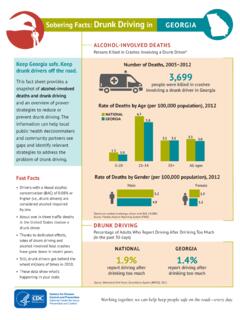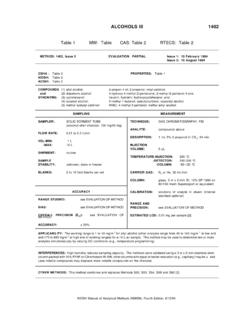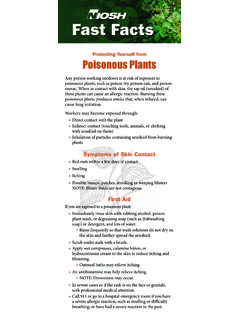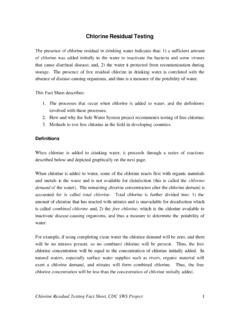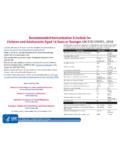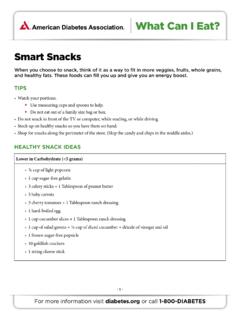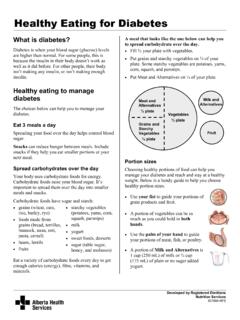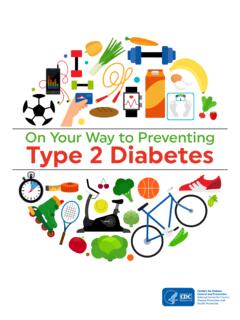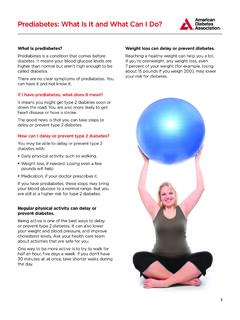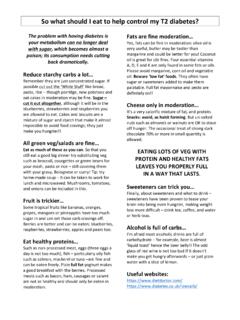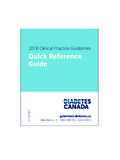Transcription of Session 14: Overview - Centers for Disease Control and ...
1 Session 14: Make Social Cues Work for You Session 14: Overview The Power of Social Cues Social cues are occasions that trigger us to behave in a certain way when we're around other people. For example, watching a football game with friends is a social cue for many people to eat snacks and drink beer or soda. Social cues sometimes make it hard to stay on track with healthy goals. Our responses to social cues are usually habits we've formed over a long time. Usually those habits are hard to change. However, this program will show you how to do so.
2 Dealing with Social Cues Quick Fact The best way to overcome social cues is to stay away from them. But staying away is not always Is it true that people with possible. In such a case, we can try diabetes cannot eat sweets? changing the cue or responding People with diabetes can differently to it. eat sweets and dessert if those foods are part of a Not all social cues are problems, healthy meal plan that is however. Some social cues will combined with plenty of help you eat healthier and be more physical activity.
3 Active. Sugar is not off limits to people with diabetes. But people with diabetes must be careful about how much sugar they eat. National Diabetes Prevention Program 1. Session 14: Make Social Cues Work for You The Special Events Challenge Social cues are particularly strong at special events such as parties, holidays, or vacations. In addition, having guests in our home or being a guest in someone else's home can give us an excuse to overeat. Try to expect the difficulties that may occur, and plan ahead. Staying the Course Remember that it takes time to break an old habit or to build a new one.
4 Change does not happen overnight. With social cues, at least two people are involved in making a change: you and someone else. Having another person involved makes the change more difficult because we cannot expect other people to adjust instantly to our new way of thinking. Stay positive. Think of every social event as a chance to learn what works well for you and what does not. Remember, you are building healthy habits for a lifetime. National Diabetes Prevention Program 2. Session 14: Make Social Cues Work for You Examples of Social Cues Social cues are occasions that trigger us to behave in a certain way.
5 They involve other people, not just ourselves. When we react to a social cue in the same way over and over, we build a habit. The other person has also learned a habit. When two people are involved, breaking a habit is even harder than when it is just you who must adjust to change. Problem social cues Examples in your life The sight of other people eating problem foods or being inactive. Being offered (or pressured to eat) problem foods. Being invited to do something inactive such as watch a movie and eat popcorn.
6 Hearing complaints, especially about eating or not eating something. National Diabetes Prevention Program 3. Session 14: Make Social Cues Work for You Examples of Social Cues (continued). Not all social cues are problems, however. Below are some examples of helpful social cues: Helpful social cues Examples The sight of other people eating healthy foods or being active. Being offered healthy foods or invited to do something active. Being praised. National Diabetes Prevention Program 4. Session 14: Make Social Cues Work for You Dealing With Problem Social Cues We can change social cues.
7 Or we can change how we react to them. Stay away from the cue, if you can. For example, move to a different room when someone is eating a tempting food. Spend time with people in ways that do not involve eating. Change the cue, if you can. Discuss the problem with those involved. Think of other options. Tell the other person about the program and your efforts to lose weight and be more active. Ask others for support. Ask them to praise you for your efforts and to ignore your slips. Practice responding in healthier ways to offers of unhealthy food.
8 Say No, thank you.. Respond in a gentle but firm manner. Suggest something they can do to help you. For example, No, thanks. But I would love a glass of ice water or a diet soda.. Remember, it takes time to change habits. National Diabetes Prevention Program 5. Session 14: Make Social Cues Work for You Social Cues at Special Events Social cues are powerful at special events such as parties or weddings. Sometimes, social events can . Upset our routine. Challenge us with unusual food and social cues. Involve habits that were formed over many years and so are strong.
9 To manage social cues at special events, try these ideas: Options Examples Eat something before the event, so you won't be hungry. Plan ahead. Plan your meal in advance. Budget your fat grams ahead of time. Plan to eat the best (in small portions) and leave the rest. Bring a tasty, low-fat dish to share. Stand as far away as you can from the table with the food. Stay away from Keep your hands busy with a glass of water, coffee, tea, or diet soda. problem cues. Watch the alcohol. It lowers your willpower and makes you hungry.
10 Clear the table as soon as possible after a meal, and put the food away. Change problem Discuss your goals with your family, friends, guests, host, or cues. hostess. Ask others to praise your efforts and to ignore your slips. Respond to problem Practice a polite but firm, No, thank you.. cues in a more Suggest something else they can do to help you. No thanks, but I would love a glass of ice water or a diet soda.. healthy way. Serve healthy foods at home. Bring healthy foods to share at other people's homes. Use low-fat products to lower the fat in favorite recipes.



